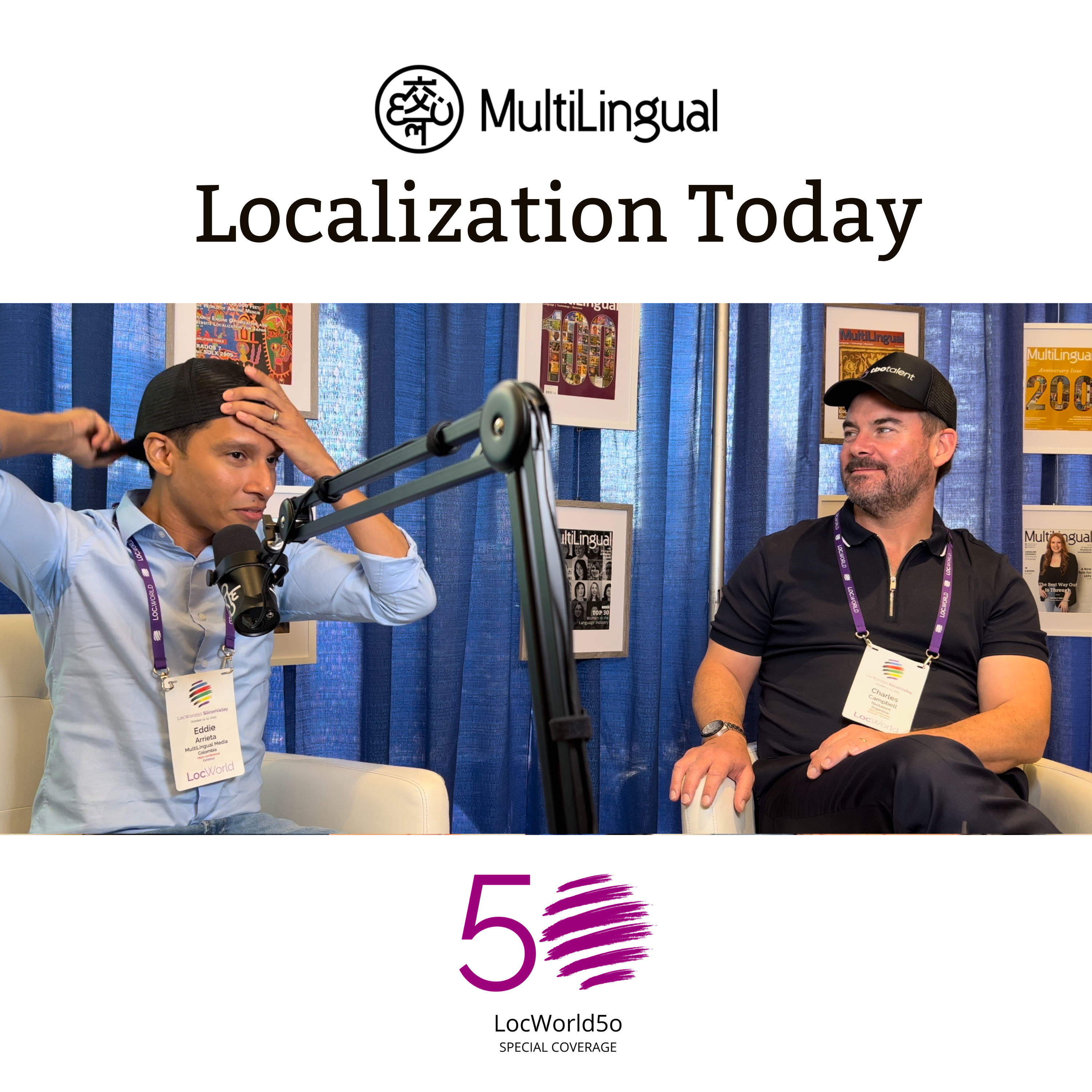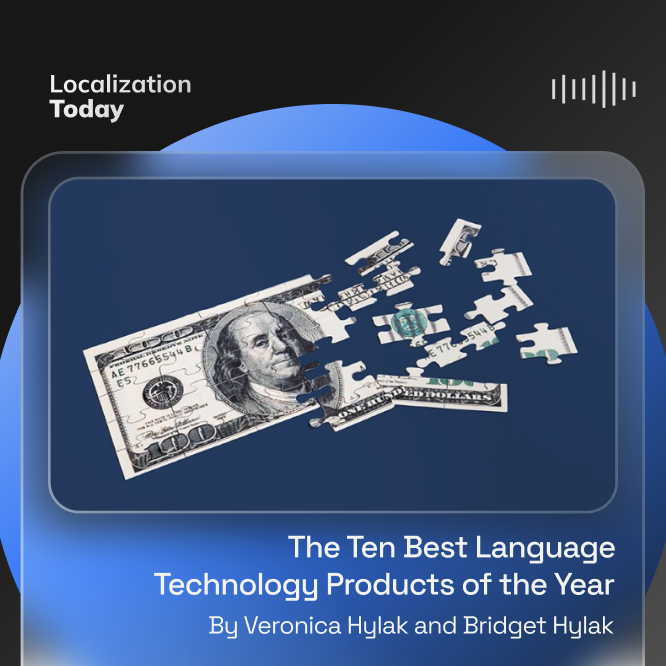Episode Transcript
[00:00:00] Speaker A: The following is my conversation with Luis Lopez, principal product manager at RWS. We had a conversation at Log World 51 in Dublin, Ireland. We talk about Trados, Trados studio, and the history that's taken the company to where they are right now. Enjoy.
[00:00:17] Speaker B: Thank you, Eddie, nice to speak to you. So my name is Luis Lopez, I'm based in Germany, and I work for the Trados part of RWS.
How I got started, actually in May, I had my 21st year at Trados, so I joined the company 21 years ago. So quite a long time.
I was a baby when I started, so that's how I got into localization. So I didn't have. I was more of a network specialist or computer networking, and I started out in customer support at Tradas, so supporting all the Trados workbench products.
Then I managed the german support team, and then about ten years ago, I switched into product management, where I'm now.
Originally I was taking care of terminology management solutions, Groupshare, which is a collaboration solution.
And now since 2017 to 18, I am responsible for the Trados cloud products.
So, yeah, that involves things like terminology management, workflow management, translation management system.
My original track was just to be in it, so just general it nothing to do with the actual content. I always liked languages in school. I grew up bilingual, I had family in France, so I spoke Portuguese, German, French, Spanish, automatically, right? And so I always had some love for languages, naturally, right, but also for technology. So even though I didn't specifically target to go into that field, it naturally happened and was a good match, which is why I'm still here 21 years later. Right. History, obviously. Very, very long history. So actually Trados is celebrating 40 years this year. It was founded in 1984.
So quite a long time ago.
And yeah, I think it's history, right? It was the first main cat tool in the industry and it grew from there. There were lots of impactful changes since then. Right? So I joined before the STL acquisition, but. So the STL acquisition happened. Then the launch of Toronto studio, which was a completely new modern cat tool.
Yeah, lots of competition popping up with memo queue, XCM phrase.
Then we also acquired idiom, who had world server. And so I think what was our focus in the last few years was we had a lot of different products from different acquisitions, so we were very much focusing on streamlining the portfolio. So bringing everything into one product line, which is the Trados cloud now, and integrated with Shadow Studio, which is the leading cat tool in the market. Right, because we want linguists to keep working in their native environment. And so they can be as productive as they can be, not restricted by the TMS they have to work in. Right?
Yeah. And on launches, right. So I mean, in the cloud we release multiple times a week, right. So they are actually on a monthly basis you get new releases. So it's very fast paced because it's a continuous delivery model. So there we're launching quite a lot. But what's probably of interest for many people is also that the new version of Trado Studio 2024 is coming out. So that's the latest release we're in pre launch. It will be coming out this month.
And there the focus is really on two main items. One is AI. Obviously it's in everyone's minds right now.
So what we are doing at Trout is obviously we want to build the tools that help linguists be the best they can be.
The focus of the AI is actually for us to help the linguists.
So there's functionality around just helping with giving feedback on the content to also spur some creativity where you can check some alternate translations and get some inspirations, but also massage the text into the audience you're talking to. So LLMs, you can prompt them. So we have that integrated into studio so you can tell it, I don't make this more formal, less formal. Remove gender bias, target it to an audience of school children in Japan, depending on what you're translating. Right. So that's one big focus. So giving the power of AI to linguists.
But then the other thing that's very important for us is also we focused a lot on accessibility, making studio accessible for visually impaired users. So we've actually been working with the blind translator who is working for us, whereby we basically made the whole Trados product accessible to screen readers.
And it's quite powerful seeing her work, essentially because she has a brial keyboard, whereby basically whatever is in the screen, the keyboard, I'm not an expert in this here, but it's very interesting. The keyboard basically dynamically writes the braille and so she can touch it, and then the screen is reading to her what she's seeing and at very fast speed. And so we made the whole Trado studio, but also the cloud platform accessible to screen readers. So that's one of the big benefits of the new feature is that now visually impaired users can actually productively also work and translate. So that's something we're really excited about. I mean, one of the curses and benefits of being part of a big LSP like RWS is that while we have technology for the wider market.
We're also part of the largest LSP with the largest in house pool of trend linguists, right. So we have, I think, over 1200 linguists actually employed by RWS. So that for us from a product fund, gives us a lot of easy access to linguists, right. Because they're essentially our colleagues.
So that helps us run focus groups with linguists. That helps us understand how they work, the challenges that they have with a wide variety of linguists. But we obviously also work quite closely with the freelance market and actual customers so that we don't get biased too much to just RWS linguists. Right. Because the reality may differ quite a lot. So, yeah, it's something that we're seeing a trend quite a lot as an LSP is that basically our enterprise customers, they used to come to us and basically say we want a translation into Spanish, and they would use that Spanish for Spain, european markets, but also south american markets, and maybe even californian markets, right, but Spanish in South America and Spanish in California is quite different. Right? As you say, there's lots of nuances, there's dialects. And so what we saw as a trend is that we get more and more enterprises, actually, they want like very focused translation to those audiences, right. So if you're a brand, you may want to directly speak the language of a spanish speaking person. That's in California, for example. Right. And so if you can speak to that person with the, with the dialect, right. So that's why we, we started to, to get lots more requests like that.
And so obviously you need to find linguists that can speak that local language, right. So there's lots of opportunities for people that are in those communities to work with us.
But as you say, I think that's also where I can play a role whereby machine translation. Right. Especially for, for these languages that don't have much content is, is very generic, right. But where I can help is like, like my example of the japanese school kids, right, is you can, you can keep prompted to give you content suitable for, for that micro audience, et cetera, that you want to target, right. So that's quite an interesting aspect. I mean, it's early days still, but that's definitely a trend we're seeing. Innovation is always a challenge because you have a roadmap, you have a standard roadmap, and there's always important things. There's never time to really sit down and have innovation. So you actually need to actively foster it and enable the teams. So what we actually do is we started a few years back to basically give our technical teams and development teams, we gave them usually in January, we do this in January. We give them basically a sprint, which is typically two weeks, whereby we basically say, everyone except the people that usually give feature requests, like me, can pitch ideas beforehand. And then we get lots of ideas. I think last January we had 80 ideas submitted by the actual developers and technical people, things they would like to explore.
And then we let people find groups that, areas of interest, so then people can say, I want to work on this topic, and then they work for those two weeks on those topics. Right. And it's actually quite. Yeah, it's amazing what, what people come up with. Right. And that encourages their creativity and it gives us ideas that we maybe haven't thought of and what's possible. And we try as much as possible to then also make space to put that into the product. It's not always possible, depending on the idea and capacity, but that's something we do and we would like to do more. But yeah, it's very important, for sure. Watch out for the new studio release coming very soon. And also we have a cloud TMS product. We actually have a free trial. So you can just go on our website, trial it for 30 days, have a look at it, and yeah, if you're already using our product, keep the feedback coming. We want to improve it for you, our customers.
[00:10:49] Speaker A: That was our conversation with Luis Lopez, principal product manager at RWS at Logworld 51 in Dublin, Ireland. This is localization today. And my name is Eddie Arrieta, CEO of multilingual magazine. Thanks for listening.


